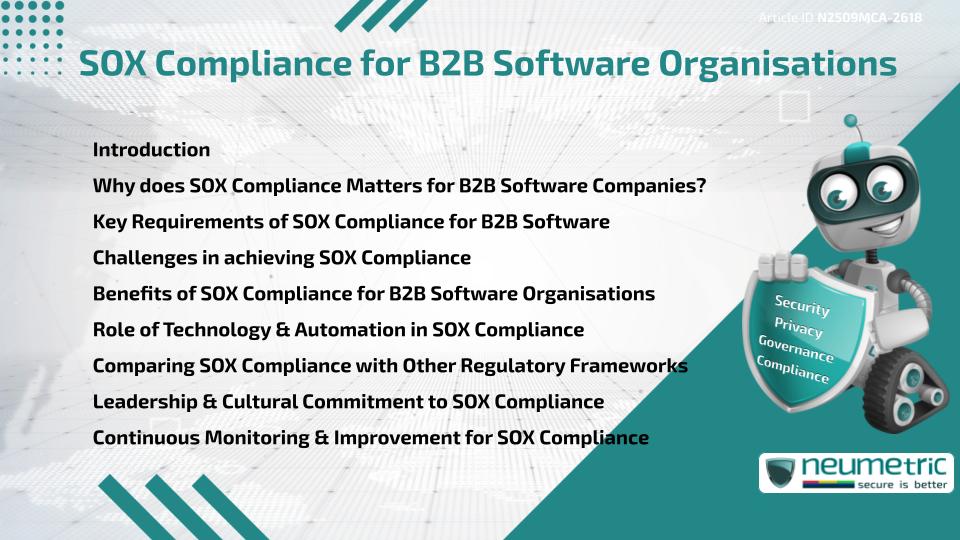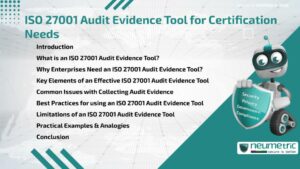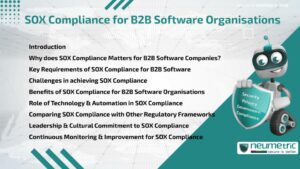Table of Contents
ToggleIntroduction
The SOX Compliance for B2B Software refers to the adherence of business-to-business software companies to the Sarbanes-Oxley Act [SOX], a United States federal law passed in 2002 to protect investors by improving the accuracy & reliability of corporate disclosures. For B2B software organisations, Compliance ensures that Financial reporting processes are accurate, secure & transparent. While originally targeted at public companies, SOX requirements affect software organisations that provide solutions supporting Financial operations, Data Management & Reporting. By meeting SOX Compliance obligations, B2B Software firms build Credibility, minimise Risks & foster Trust among Clients & Regulators.
Why does SOX Compliance Matters for B2B Software Companies?
B2B software companies often develop platforms that handle Sensitive Financial data or support Clients in regulated industries. Any gaps in Compliance can lead to inaccurate Financial statements, Data Integrity issues or Security Breaches. The SOX Compliance for B2B software helps organisations:
- Safeguard against fraudulent Financial practices.
- Demonstrate Accountability in handling Financial data.
- Strengthen relationships with Enterprise Clients subject to SOX requirements.
- Avoid Legal penalties & Reputational damage.
This Compliance is not just a legal mandate but a business enabler, reinforcing long-term Client trust.
Key Requirements of SOX Compliance for B2B Software
The SOX Compliance for B2B software encompasses several core requirements:
- Internal Controls: Implementing processes to ensure Data accuracy, Reliability & Protection.
- IT Security Measures: Applying Controls like Access management, Encryption & Monitoring to safeguard data.
- Audit Trails: Maintaining detailed logs of data access, changes & transactions.
- Data Integrity & Accuracy: Ensuring that software systems generate reliable Financial reports.
- Independent Audits: Allowing external Auditors to review Compliance with SOX requirements.
These requirements demand that B2B software organisations integrate Compliance into their development & operational workflows.
Challenges in achieving SOX Compliance
Despite its importance, the SOX Compliance for B2B software comes with challenges:
- Complexity in aligning technical systems with Financial regulations.
- Resource constraints for smaller Software Providers.
- Ensuring consistent Compliance across multiple Clients & Jurisdictions.
- Keeping up with evolving Threats such as cyberattacks that could compromise Data Integrity.
Overcoming these challenges requires robust planning, investment in tools & cross-departmental collaboration.
Benefits of SOX Compliance for B2B Software Organisations
Compliance offers significant advantages:
- Enhanced Trust with enterprise Clients that rely on accurate Financial reporting.
- Stronger Data Security practices integrated into software solutions.
- Reduced Risk of Financial misstatements & fraudulent activities.
- Competitive edge when serving Clients in regulated industries.
- Improved reputation for Reliability & Transparency.
These benefits highlight how Compliance drives both operational resilience & business growth.
Role of Technology & Automation in SOX Compliance
Technology plays a central role in meeting SOX obligations. Automated systems can streamline Compliance by:
- Enforcing Access Controls & Segregation of duties.
- Maintaining Audit logs without manual intervention.
- Monitoring transactions for anomalies.
- Generating Compliance Reports quickly & accurately.
Automation reduces human error & improves the efficiency of SOX Compliance for B2B software organisations.
Comparing SOX Compliance with Other Regulatory Frameworks
While SOX focuses on Financial reporting & corporate Governance, other frameworks such as ISO 27001 & the General Data Protection Regulation [GDPR] emphasise Information Security & Data Privacy. Unlike GDPR, which governs Personal Data processing, SOX focuses on Financial integrity. However, many B2B software organisations pursue multiple frameworks together to achieve comprehensive Compliance & Risk Management.
Leadership & Cultural Commitment to SOX Compliance
Compliance is not solely a technical issue; it requires leadership commitment & cultural adoption. Executives must prioritise SOX obligations, allocate resources & promote a culture of Transparency. Employees, in turn, need to understand their role in maintaining accurate Records & adhering to internal Controls.
Continuous Monitoring & Improvement for SOX Compliance
Compliance with SOX is not a one-time exercise but an ongoing responsibility. Organisations should:
- Conduct regular Audits of Internal Controls.
- Update Security Measures to address new Risks.
- Review & refine Compliance strategies based on feedback.
- Provide Continuous Training to Employees involved in Financial Reporting.
Continuous Monitoring ensures that Compliance remains effective, sustainable & aligned with business growth.
Takeaways
- The SOX Compliance for B2B software ensures accurate Financial reporting & Data Integrity.
- It involves internal controls, IT security, Audit trails & external Audits.
- Challenges include Complexity, Resource needs & evolving Threats.
- Compliance builds Trust, Competitive advantage & stronger Client relationships.
- Continuous Monitoring & Leadership commitment are essential for sustained Compliance.
FAQ
What is SOX Compliance for B2B software?
It refers to B2B software organisations adhering to the Sarbanes-Oxley Act requirements to ensure accurate & secure Financial reporting.
Why is SOX Compliance important for B2B software companies?
It safeguards against Financial misstatements, improves Data Integrity & strengthens Trust with enterprise Clients.
What are the key requirements of SOX Compliance for B2B software?
Key requirements include internal controls, IT Security Measures, Audit trails, Data accuracy & independent Audits.
Is SOX Compliance mandatory for all B2B software companies?
It is mandatory for public companies & highly relevant for Vendors supporting SOX-regulated clients.
How does SOX Compliance differ from GDPR?
SOX focuses on Financial integrity & corporate Governance, while GDPR focuses on protecting Personal Data Privacy.
What challenges do B2B software companies face in SOX Compliance?
Challenges include aligning systems with regulations, resource constraints & handling evolving Cybersecurity Threats.
How can technology support SOX Compliance for B2B software?
Automation can streamline Compliance by enforcing Controls, generating Reports & maintaining Audit trails.
Need help for Security, Privacy, Governance & VAPT?
Neumetric provides organisations the necessary help to achieve their Cybersecurity, Compliance, Governance, Privacy, Certifications & Pentesting needs.
Organisations & Businesses, specifically those which provide SaaS & AI Solutions in the Fintech, BFSI & other regulated sectors, usually need a Cybersecurity Partner for meeting & maintaining the ongoing Security & Privacy needs & requirements of their Enterprise Clients & Privacy conscious Customers.
SOC 2, ISO 27001, ISO 42001, NIST, HIPAA, HECVAT, EU GDPR are some of the Frameworks that are served by Fusion – a SaaS, multimodular, multitenant, centralised, automated, Cybersecurity & Compliance Management system.
Neumetric also provides Expert Services for technical security which covers VAPT for Web Applications, APIs, iOS & Android Mobile Apps, Security Testing for AWS & other Cloud Environments & Cloud Infrastructure & other similar scopes.
Reach out to us by Email or filling out the Contact Form…





